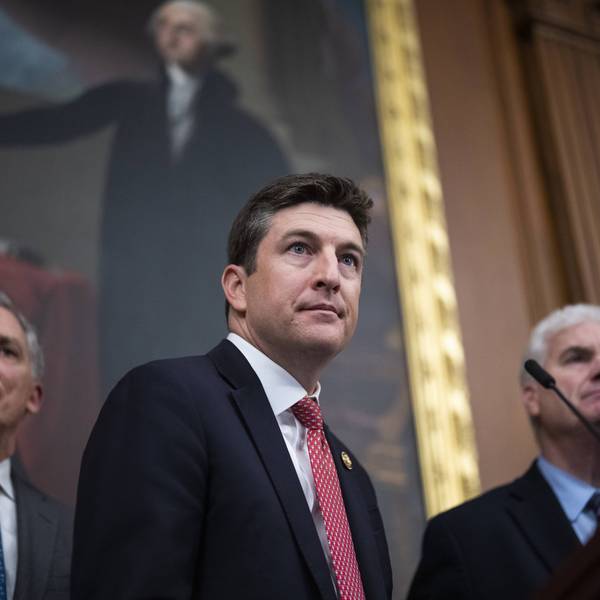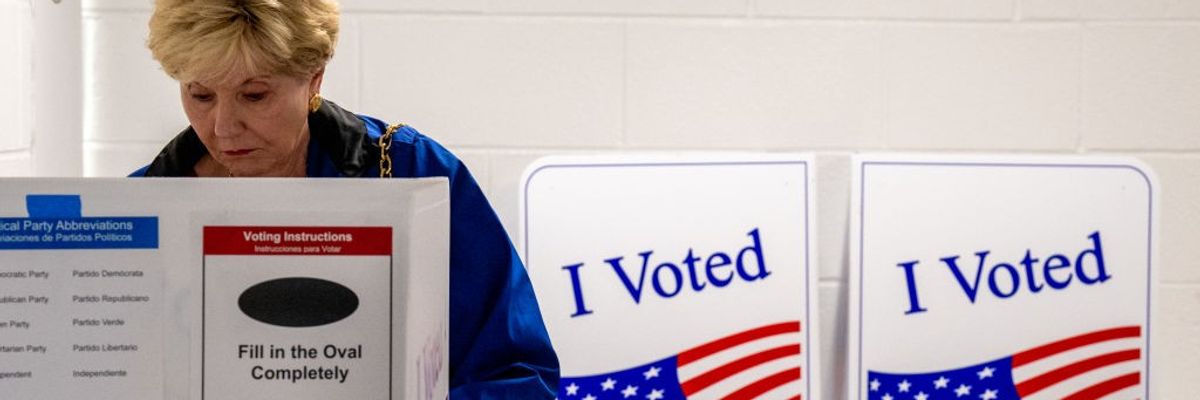Democracy defenders responded with alarm on Wednesday to a decision from the U.S. Supreme Court's right-wing majority allowing Virginia to resume its purge of state voter registration rolls while early voting is underway for next Tuesday's election.
Stand Up America managing director of policy and political affairs Brett Edkins framed the court's decision as a gift to former Republican President Donald Trump, who appointed half of the conservative justices and is facing Democratic Vice President Kamala Harris in the November 5 contest for the White House.
"This eleventh-hour move by the Roberts Court to allow Virginia to purge registered voters from the voter rolls is a troubling attempt by the Supreme Court's MAGA majority to come to Trump's aid just days before the election," Edkins said. "This last-minute purge will impact American citizens, including newly-eligible voters, and undermine our democracy and the freedom to vote."
"Americans deserve a nonpartisan Supreme Court that will stand up for our rights and protect the will of the people—the Roberts Court is not it," he continued. "We must turn out in record numbers to keep Trump out of the Oval Office and prevent him from appointing even more MAGA justices who put partisan interests over Americans' freedom to vote."
The high court's right-wing majority did not explain the reasoning behind Wednesday's decision, which came after a federal judge determined that Virginia illegally booted 1,600 people from the rolls and an appellate court agreed.
Liberal Justices Ketanji Brown Jackson, Elena Kagan, and Sonia Sotomayor dissented, only saying they would deny the application from the administration of Republican Gov. Glenn Youngkin, who welcomed the high court's move.
Meanwhile, Slate senior writer Mark Joseph Stern explained that "the Supreme Court's decision is extremely worrisome because the National Voter Registration Act of 1993 *explicitly forbids* systematic purges of voter rolls shortly before an election. It now looks like the conservative supermajority will let states ignore that prohibition."
The Virginia program was purportedly intended to remove noncitizens—who already cannot legally vote—from the rolls.
CNN reported Wednesday that "Trump and other Republicans have seized on claims of illegal voting and that was part of the argument they made to explain the former president's loss in 2020. But documented cases of noncitizens voting are extremely rare. A recent Georgia audit of the 8.2 million people on its rolls found just 20 registered noncitizens—only nine of whom had voted."
In the case of Virginia, Stern noted, "we know this purge has targeted qualified citizens."
The Campaign Legal Center represented state groups that challenged the program. In a series of social media posts, Danielle Lang, the organization's senior director for voting rights, said that "many of the Virginia voters who have been kicked off the rolls are eligible citizens. These are eligible Virginians who deserve to have their voices heard."
"The Supreme Court allowing Virginia to engage in a last-minute purge that includes many known eligible citizens in the final days before an election is outrageous," Lang declared. "But the voters will decide this election, not the courts. Eligible Virginia voters should know that regardless of this purge they can register to vote on Election Day and cast their ballots."
"I am hopping mad. The Supreme Court issued an unreasoned order reinstating a purge in Virginia based on faulty evidence that was capturing known eligible U.S. voters," she added. "But folks need to channel their (correct) anger into action. These voters can vote by registering same-day in Virginia. And that's why reforms like same-day registration are so important."
The Brennan Center for Justice at New York University School of Law also criticized Wednesday's decision but emphasized that eligible Virginia voters can still participate in the upcoming election.
"By issuing a stay in the Virginia mass voter challenge case, the Supreme Court has injected confusion into the election. This stay will cause eligible Virginia citizens to be purged from voter rolls just before the election—all in service of a conspiracy theory," the Brennan Center said. "For any eligible voter in Virginia who may be impacted by the purge, please use same-day registration to cast a vote in this election. Or call (866)-OUR-VOTE if you need assistance."
This decision is just the latest in a long series of moves that have heightened concerns about the court's right-wing justices.
"In any election-related cases, we should question the impartiality of Clarence Thomas, whose wife tried to overturn the 2020 election, and Samuel Alito, who had two January 6-supporting flags flying at his homes," Revolving Door Project executive director Jeff Hauser said in a Wednesday statement, referring to the 2021 attack on the U.S. Capitol.
Hauser added that "this shadow docket decision is horrifying on the merits—but even more so if Thomas and Alito took part in it despite the fact that their impartiality can be reasonably questioned."
Take Back the Court Action Fund president Sarah Lipton-Lubet said that "when the right-wing court sees a law it doesn't like, it pretends it doesn't exist. And that's exactly what happened here: The partisan ideologues on Trump's Supreme Court pushed aside the clear language of the law to ensure fewer Americans can make their voices heard at the ballot box—all in service of supporting Donald Trump's bogus narrative about voter fraud. This is the Roberts Court's pattern: When in doubt, disenfranchise voters."




